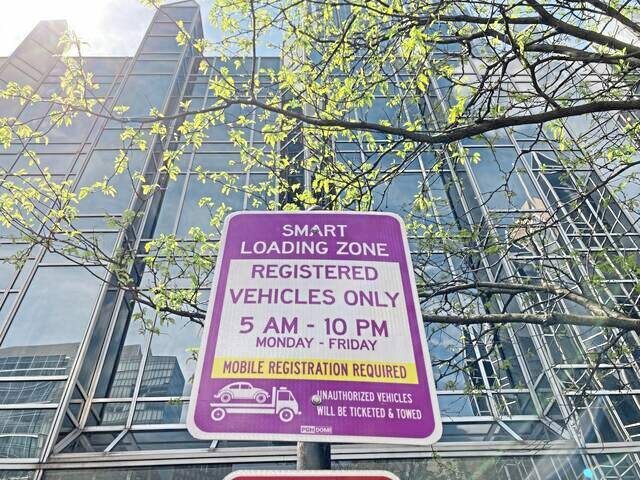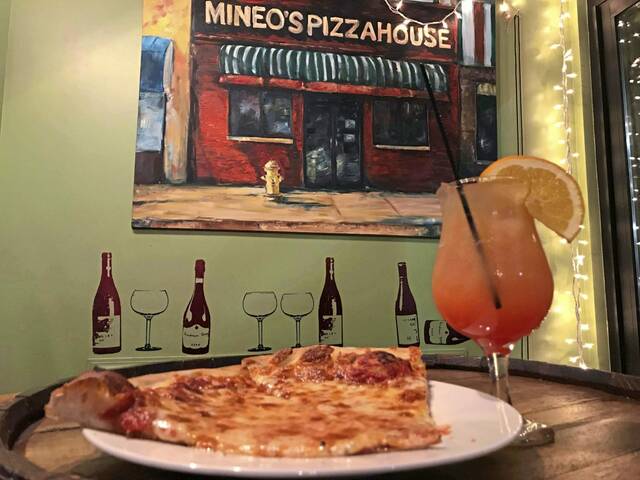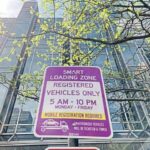John Mineo hadn’t heard about Pittsburgh’s smart loading zone pilot program until he saw crews painting the curbs purple outside of his Squirrel Hill pizza shop.
He said he’s upset city officials didn’t work with business owners before implementing a new system that he says is hurting businesses.
City officials have touted the smart loading zones — marked with purple paint on the curb and corresponding purple signs — as a way to make it easier for delivery drivers to quickly get in and out of parking spots outside local businesses. Mineo said the pilot program isn’t actually making things easier for his business.
The program launched in April 2022 with a $100,000 grant from Los Angeles-based Automotus. City leaders said it would make it easier for delivery drivers with companies such as Door Dash, Uber Eats or Amazon to find parking spots they could briefly use to drop off or pick up deliveries.
To encourage people not to linger in the special spots for too long, the smart loading zones use a graduated payment system. For the first five minutes, cars are charged seven cents a minute. That number jumps incrementally, up to 27 cents a minute for cars that are parked between 30 and 60 minutes. A driver who parks in a smart loading zone for eight hours would be billed for nearly $130.
The smart loading zones include cameras that automatically charge vehicles for parking there by reading license plates.
Mineo, who owns Mineo’s Pizza House, said the system is hurting his customers and his business operations, and he’s upset that city officials didn’t reach out directly to the businesses who are impacted.
“It’s a shame the city didn’t come to the people in the community,” he said. “We run the community.”
For about 30 years, Mineo said, there was a standard loading zone outside his business where he could have deliveries dropped off to support the business. These larger orders could sometimes take about two hours to deliver, he said, which would become quite costly under the new smart loading zone system.
Mineo said he feared the company dropping off the deliveries would raise his prices to cover the costs of paying to park there.
He said he is hosting a meeting with city officials and other local business owners next week to try to address the problem.
“We’re going to tell them how we feel,” he said. “We’re not happy about it.”
Mineo said there was no need for the city to create a new loading zone system — they could’ve simply enforced the system already in place. He questioned why parking enforcement didn’t work to better regulate the existing loading zones and ticket people who parked there longer than allowed or otherwise caused problems.
The smart loading zone pilot program launched in the city’s Central Business District as a one-year initiative. City Council later extended it for an additional three years, and city officials have expanded the program’s footprint to include Oakland and Squirrel Hill.
Maria Montaño, a spokeswoman for Mayor Ed Gainey, said about 20 new smart loading zones have popped up in Downtown, Oakland and Squirrel Hill over the past few weeks. She said the city determined where to implement them based on various factors, including “traffic and utilization data.”
Montaño said the mayor’s office met with local business advocacy groups and posted signs to alert people that the new loading zones would be implemented.
Though some business owners disagree, Montaño said the program is meant to benefit businesses.
“Ultimately, we feel it can help businesses be able to offer more delivery turnaround,” she said.
Early data from the program’s first year shows that most turnover happens in under five minutes, while vehicles are still being charged about seven cents a minute, Montaño said.
“In places where these zones exist, oftentimes we saw double parking, which would lead to traffic backups, congestion, more risks for folks who aren’t in automobiles,” she said. “We’ve seen upwards of a 40% reduction in double parking where those loading zones are available. It’s also cheaper for the delivery drivers that are the primary users of those spaces.”
Related:
• Pittsburgh implements new parking zones for delivery drivers• Pittsburgh council looks to extend parking zone program for delivery drivers
• Pittsburgh extends 'smart loading zone' program for delivery drivers for 3 years
Regardless of what city officials hope the program can do for businesses, Mia DeMeo believes the program is hurting her Squirrel Hill consignment shop.
She’s lost three parking spots outside her store, A Child’s Wardrobe and Adults Too. Two of them were converted to smart loading zones — without anyone consulting with her — and the third had been converted to a bicycle and scooter parking space a few months ago, she said.
“I was so clueless,” DeMeo said. “I had no idea what was happening.”
Previously, she said, those three spaces were a loading zone where people could park free for 15 minutes. That system, she said, allowed customers to easily park for a few minutes while they unloaded their consignment items or popped into the store to shop for a few minutes.
“Those parking spaces were very valuable to me,” DeMeo said, adding she had also used the space to unload her own vehicle.
She recalled that customers used to tell her they stopped by because they saw a parking spot in front of the store — but that won’t happen now.
Business has dropped by more than half at her store since the smart loading zones were implemented a few weeks ago, DeMeo said.
“They have to give me my parking spots back,” she said. “It’s horrible.”
DeMeo said she feels the smart loading zones are “just a money thing.” She believes the city is hoping to rake in more cash from people who park at the spots, which can rack up a hefty bill in a relatively short period of time.
Because people don’t want to park in the new purple zones, she said, people have stopped patronizing local businesses.
“It’s not even an exaggeration — they’re killing our businesses,” DeMeo said.
DeMeo wants the city to take away the smart loading zones and the scooter and bike parking spot, which she says is seldom used, and replace them with a system that would once again encourage people to support Squirrel Hill businesses.
“It’s serving no purpose but taking money away from my business,” DeMeo said.











